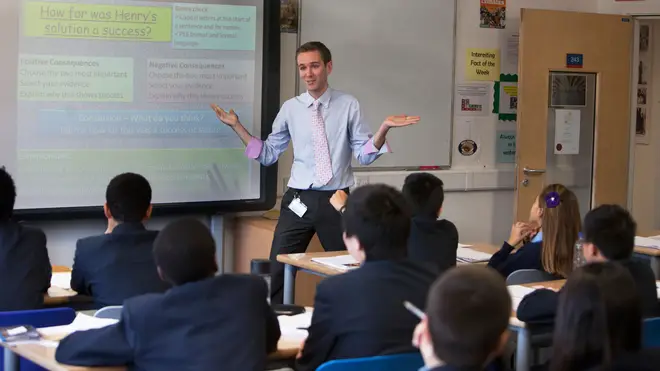
Paul Brand 10am - 12pm
20 July 2022, 10:25 | Updated: 20 July 2022, 11:45

Students in a London Labour run council have adopted a zero school exclusions policy which will stop all secondaries from kicking out pupils for bad behaviour.
Southwark Council is the first borough in the country to ask schools to sign up to a policy to keep all pupils in the classroom unless they put other children at risk.
Teachers are instead encouraged to take a "trauma-informed" approach to pupil behaviour and are asked not take bad behaviour at 'face value.'
A 2020 report by Southwark council found it excluded more pupils than average while a separate report from the borough found black pupils were 1.5 times more likely to be excluded from school than their white peers.
But in the autumn 2021 term, there were no exclusions in Southwark schools, and the council hopes it will be the first borough in England with zero exclusions in the coming years.
Read more: Lucky winner richer than Adele after scooping record £195m EuroMillions jackpot

Education expert says badly behaved pupils need to be excluded
The agreement calls for "100% inclusion of children in education that keeps them safe and enables them to flourish".
"Where appropriate, we will implement a trauma-informed response to behaviour of concern in children," it adds.
"By this, we mean not taking concerning behaviour at face value but striving to understand what is driving that behaviour," it says.
Southwark police will also be asked to sign up to the agreement, which states: "Our aspiration is for 100 per cent inclusion of children in education that keeps them safe and enables them to flourish.
"Where appropriate, we will implement a trauma-informed response to behaviour of concern in children.
"By this, we mean not taking concerning behaviour at face value, but striving to understand what is driving that behaviour.
"We will strive for best practice across our policies and processes and towards 100 per cent inclusion approaches to behaviour in education settings."
Read more: Dance school scraps ballet auditions saying it’s an ‘elitist white art form’

Nick Ferrari challenges councillor over exclusion ban
Councillor Jasmine Ali, cabinet member for children, young people and education, said: "With over 95% of schools at good or outstanding quality, we are really proud of our education offer.
"But we know that not every child finds mainstream education fits their needs.
"So we are here for those children especially - if they need particular support, either within the mainstream school setting, or in specialist education, and what we want to avoid at all costs, is exclusion, and children being left in a no-man's-land where parents feel they have no choice but to try to educate their children themselves."
She added that when parents felt pressured to home-educate children, "this often proves an impossible challenge for families and leaves children vulnerable to falling out of society".
Cllr Ali continued: "This is why we want the Inclusion Charter to keep them in formal education of all kinds - to be safe, to succeed, to flourish and to enjoy their education."
In a foreword to the charter, Ms Ali said the borough was proud of how most of its schools were rated "good" or "outstanding" by Ofsted, but added that "we are not talking about a simple rosy picture here".
"We see poverty, we see inequality, we see gangs and violence and we have seen children excluded from education," she said.
The charter commits to a multi-agency approach focused on early intervention with pupils.
Schools signing up to the charter must pledge not to "encourage parents to explore Elective Home Education as a resolution to issues with inclusion" - widely seen as a form of off-rolling.
The charter says that managed moves between schools may offer pupils a "fresh start" but that discussions about a possible move for a pupil must not take place informally.
It adds that it recognises "there are rare instances where exclusion is unavoidable to safeguard children".